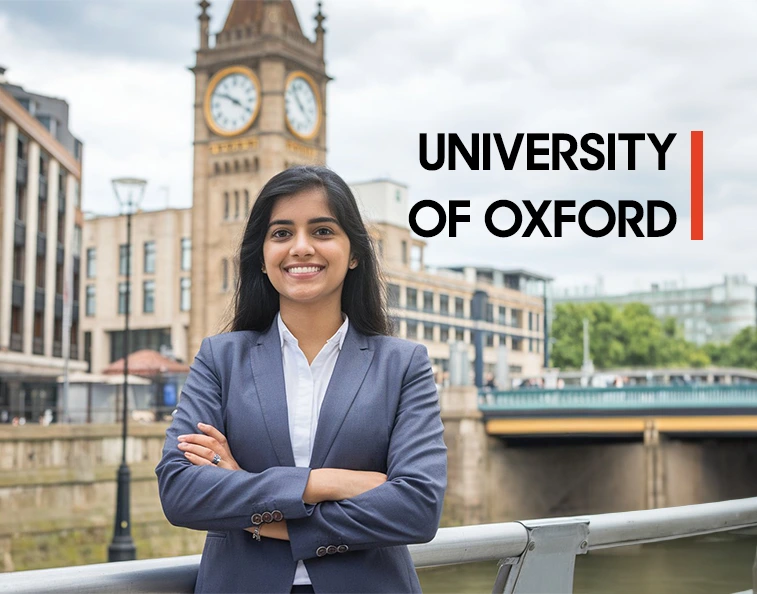Study at University Of Oxford
Don't know what to do?
Get Free Counseling
Oxford University Complete Guide
The University of Oxford is one of the world's oldest and most prestigious universities. Established in 1096, it has played a pivotal role in the Renaissance, the Reformation, and other social movements. Today, it is a center of excellence in engineering and computing and is at the forefront of research in areas such as artificial intelligence and quantum computing.
Why Oxford is a Top Choice for Graduate Education?
The University of Oxford is a top choice for study abroad for many reasons, such as:
- Excellence in research
- Multiple choice in intensive study programs
- Academic community
- Prestigious programs
- Collaboration with the best research universities in the world
- Notable alumni
Facts about Oxford University
Oxford University ranks 3rd globally as per 2025 QS World Rankings.
28 UK Prime Ministers, 28 Nobel Prize winners, 55 Nobel Prize winners, and 120 Olympic medal winners are alumni of Oxford University.
Sir Stephen Hawking is an alumnus of Oxford University.
80% of recent Oxford graduates are working in the fields of education, R&D, or health industries.
Types of Graduate Degrees at Oxford University
Oxford University offers a broad range of graduate-level study programs, postgraduate certificates, and doctorates.
Master’s Degrees Available at Oxford University
The University of Oxford offers 200 study programs at master-level courses. Some of the Master's degrees include:
- Master of Arts (MA)
- Executive Master of Business Administration (EMBA)
- Master of Business Administration (MBA)
- Master of Studies (MSt)
- Master of Fine Art (MFA)
- Magister Juris (MJur)
- Master of Public Policy (MPP)
- Master of Theology (MTh)
- Bachelor of Civil Law (BCL)
- Bachelor of Philosophy (BPhil)
Oxford MA Courses
The University of Oxford offers quality MA study programs in Social Science. International students have the opportunity to work under leading academics while pursuing their studies.
Detailed information about the MA programs at Oxford University is given in the table below.
|
MA Courses |
Requirements |
|
MSc in Contemporary Chinese Studies |
Bachelor's degree in a relevant field
85% or above in Bachelor's Degree |
|
MSc in Political Theory Research |
|
|
MPhil in Global and Area Studies |
|
|
MSt in Music (Musicology) |
|
|
MSc in Politics Research |
|
|
MSt in Ancient Philosophy |
MSc (Master of Science) Degrees
Some of the popular MSc courses with detailed information are given in the table below.
|
MSc Courses |
Requirements |
|
MSc in Advanced Computer Science |
• Undergraduate Degree with honors in computer science or mathematics • 85% or above in the Bachelor's Degree • 7.5 or above in IELTS |
|
MSc in Translational Health Sciences |
• Bachelor's Degree and work experience in a relevant field • 85 or above in the Bachelor's Degree • 7.5 or above in IELTS |
|
MSc in Social Data Science |
• Bachelor's Degree in Statistics, Probability, Linear Algebra, and/or Calculus • 85 or above in the Bachelor's Degree • 7.5 or above in IELTS |
|
MSc by Research in Clinical Neurosciences |
• Bachelor's Degree in biology, biochemistry, biotechnology, neurobiology, neuroscience, or zoology • 85 or above in the Bachelor's Degree • 7.5 or above in IELTS |
|
MSc by Research in Inorganic Chemistry |
• Bachelor's Degree in chemistry, physical sciences, or biological sciences • 85 or above in the Bachelor's Degree • 7.5 or above in IELTS |
MPhil (Master of Philosophy) Degrees
|
MPhil Courses |
Requirement |
|
Development Studies |
• Bachelor's Degree in Social Science • 85% and above in Bachelor's program • 7.5 or above in IELTS |
|
Linguistics, Philology and Phonetics |
• Bachelor's Degree in modern languages, classics, computer science, philosophy, or mathematics • 85% or above in Bachelor's DegreeDegree • 7.5 or more in IELTS |
|
Modern Middle Eastern Studies |
• Bachelor's Degree in a relevant field • 85% or above in Bachelor's DegreeDegree • 7.5 or more in IELTS |
|
Environmental Change and Management |
• Bachelor's Degree in a relevant field • 85% or above in Bachelor's DegreeDegree • 7.5 or more in IELTS |
|
Classical Archaeology |
• Bachelor's Degree in anthropology, history, classics, history of art, geography, geology, biology, physics or environmental studies • 85% or above in Bachelor's DegreeDegree • 7.5 or more in IELTS |
|
History of Science, Medicine, and Technology |
• Bachelor's Degree in Biology, Physics, Mathematics, or Further Mathematics. • 85% or above in Bachelor's DegreeDegree • 7.5 or more in IELTS |
|
Medical Anthropology |
• Bachelor's Degree in a relevant field • 85% or above in Bachelor's DegreeDegree • 7.5 or more in IELTS |
|
Politics (Comparative Government) |
• Bachelor's Degree in economics, history, philosophy, sociology or law • 85% or above in Bachelor's DegreeDegree • 7.5 or more in IELTS |
|
Social Anthropology |
• Bachelor's Degree in a relevant field • 85% or above in Bachelor's DegreeDegree • 7.5 or more in IELTS |
|
Biodiversity, Conservation and Management |
• Bachelor's Degree in a relevant field • 85% or above in Bachelor's DegreeDegree • 7.5 or more in IELTS |
Other Specialized Master’s Degrees
Oxford University offers various other specialized Master's Degree courses.
|
Other Specialized Master’s Degree |
Admission Requirements |
|
Bachelor of Civil Law (BCL) |
• Bachelor's Degree in a relevant field • 85% or above in Bachelor's DegreeDegree • 7.5 or more in IELTS |
|
Bachelor of Philosophy (BPhil) |
|
|
Executive Master of Business Administration (EMBA) |
|
|
Master of Business Administration (MBA) |
|
|
Master of Fine Art (MFA) |
|
|
Magister Juris (MJur) |
|
|
Master of Public Policy (MPP) |
|
|
Master of Theology (MTh) |
Difference Between Taught and Research-Based Degrees
Detailed information about the differences between Taught and Research-based Degree Degrees is given in the table below.
|
Features |
Taught Programs |
Research-based Programs |
|
Timetable |
The taught study programs at Oxford University have a well-defined timetable of lectures, coursework, and seminars. Students can study independently in their free time, but they must follow the coursework. |
The research-based study programs at Oxford University offer students the freedom to conduct their own research project(s) in a specific field of study. Students receive guidance and support from an expert supervisor. Here are some other differences between taught and research-based degrees: |
|
Assessment Methods |
Exams, essays, and group work |
Essays, presentations, professional skills assessment, and a research project |
|
Duration |
12 months |
12 months full-time or 24 months part-time |
|
Degree |
MSc, MA, and MBA |
MRES, MLitt, MMus, MPhil, or LLM |
Key distinctions between MA, MSc, and Research
The nature of study programs of MA, MSc, and Research are distinct at Oxford University. The study programs of MA focus on social aspects, and the MSc courses are theoretical and research-oriented, whereas research concentrates on conducting original research under guidance, with minimal classroom time.
Other Scholarships and Grants
Detailed information about scholarships and grants offered at Oxford University is given in the table below.
|
Scholarship |
Benefits |
|
Hill Foundation Scholarship |
Course fees and an annual grant towards living costs. |
|
Reach Oxford Scholarship |
Full tuition fee | Grant towards the Cost of living) | One return airfare every year |
|
Charles Wallace India Trust |
Accommodation and living costs in the UK and a contribution of GBP 700 towards the international travel costs |
|
Clarendon Scholarship |
Full tuition fee | Grant towards the Cost of living |
|
Felix Scholarships |
Full tuition fee | Grant towards the Cost of living (around 17,800 GBP) | One return flight from India to UK |
|
Oxford-Indira Gandhi Graduate Scholarship |
Full tuition fee | Grant towards the Cost of living |
|
Commonwealth Shared Scholarship |
Up to 100% tuition fee waiver | Monthly stipend | Travel costs | Clothing allowance | Cost of living grants of GBP 16,164 |
|
Weidenfeld-Hoffmann Scholarships and Leadership Programme |
Full tuition fee | Grant towards Cost of living (around 18,622 GBP) |
|
Helmore Graduate Scholarships |
Full tuition fee | Grant towards the Cost of living |
|
Swire Graduate Scholarship in History |
The scholarship covers course fees and provides a grant for living costs. |
|
Richards Graduate Scholarships |
The scholarship covers course fees and a grant for living costs. |
|
Ertegun Graduate Scholarship |
Covers course fees and provides a grant for living costs. |
|
Oxford-Ashton Graduate Scholarship in Engineering |
Full tuition fee | Grant towards the Cost of living |
Oxford University Masters Programs
International students can apply for Oxford University's Master’s study programs during the final year of their Bachelor's Degree. Oxford University offers a wide range of study programs.
List of Popular Master’s Programs
Some of the popular Master’s programs in Arts and Humanities are:
- Asian and Middle Eastern Studies
- Classical Languages and Literature
- Digital Scholarship
- Economic and Social History
- Film Aesthetics
- Linguistics, Philology and Phonetics
- Medieval Studies
- Theology
- World Literature in English
- Ancient Philosophy
The popular Master's programs in the Science field are:
- Mathematical Sciences
- Mathematical and Computational Finance
- Advanced Computer Science
- Translational Health Sciences
- Social Data Science
- Clinical Neurosciences
- Inorganic Chemistry
- Surgical Science and Practice
- Integrated Immunology
- Experimental and Translational Therapeutics
The popular programs in the field of Social Sciences and Public Policy at Oxford University are:
- MSc in Comparative Social Policy
- MSc in Public Policy Research
- Values and Public Policy Course
- Public Policy 1+1
- Master of Public Policy (MPP)
Some of the popular Business and Management courses at Oxford University are:
- MBA
- Accounting
- Analytics
- Business Finance
- Firms and Markets
- Marketing
- Organizational Behaviour
- Strategy
- Technology and Operations Management
The popular online and hybrid programs at Oxford University are given below.
- Animal Behaviour: An Introduction
- Introduction to Philosophy
- Microeconomics: An Introduction
- Philosophy of Mind
- Psychology: An Introduction
- Academic Literacy: An Introduction
- Contemporary British Fiction
- Getting Started in Creative Writing
- International Labour Migration: Economics, Politics and Ethics
- Social Entrepreneurship
Course Structure and Curriculum
The postgraduate courses at Oxford University are short and offer quality education. It facilitates students' swift progress in their careers. The University offers more than 200 master’s-study programs. Oxford University has a wide range of disciplines. The duration of courses is 9 months to 2 years.
In master 's-study programs, students participate in lectures and seminars. Examinations and coursework assess them.
The documents required to apply for Oxford University are given below. You must have:
- Duly filled application form
- Proof of previous education credentials
- Motivation letter (Personal statement)
- Letters of recommendation
- Resume or CV
- English language proficiency test scores
- Other additional documents, such as:
- One or two writing tasks, such as essays
- Portfolio / CD / audio-visual data
- Proof of qualifying for other required tests such as the GRE or GMAT
- A valid passport
- Receipts of fee payment
Oxford University conducts several entrance tests to assess candidates for its study programs. The entrance tests for various fields are listed below.
- AHCAAT (Ancient History and Classical Archaeology Admissions Test)
- BMSAT (Biomedical Sciences Admissions Test)
- CAT (Classics Admissions Test)
- HAT (History Admissions Test)
- LNAT (Law National Aptitude Test)
- MAT (Mathematics Admissions Test)
- MLAT (Modern Languages Admissions Test)
- PAT (Physics Admissions Test)
- PhilAT (Philosophy Test)
- TSA (Thinking Skills Assessment)
- UCAT (University Clinical Aptitude Test for Medicine)
- Fine Art Practical
- Music Performance Test
Admission Timeline
If you want to pursue studies at Oxford, you must apply a year before the starting date of your study program by duly filling out the UCAS application form online.
The step-by-step procedure to apply for courses at Oxford University is given below.
Step 1: Evaluate your eligibility for the selected study programs
Step 2: Duly fill out the application form for the chosen college and the UCAS
Step 3: Pay the required fees and submit the application
Step 4: Wait for the decision
Step 5: Fly to the UK
Tips for a Successful Application
Some tips for a successful application at Oxford University are given below. You must:
- Research colleges and study programs thoroughly
- Have a positive attitude
- Participate in extracurricular activities
- Take advice from students at Oxford University
- Show enthusiasm during the interview process
- Start early in your application preparation
- Utilize available resources
- Attend university events or open days
- Write an individualized personal statement to you
- Take care of your health
Fees and Funding for Oxford University Masters
The academic tuition fees at Oxford University range from £25,000 to £45,000 per annum.
Detailed information about the fee structure for UK & EU and international students is given in the table below.
|
Master's Courses |
UK & EU Students |
International Students |
|
Computer science (MSc): |
£13,640 |
£28,410 |
|
Engineering (MSc): |
£13,640 |
£28,530 |
|
Economics (MSc): |
£22,010 |
£28,530 |
|
History (MA): |
£11,170 |
£23,340 |
Other Costs and Living Expenses
The living costs while studying at Oxford University differ based on your lifestyle. The expenses can range from £1,425 to £2,035 per month.
The breakdown of expenses while studying at Oxford University is given in the table below.
|
Type |
Expenses |
|
Food |
£3,960 to £6,180 |
|
Accommodation |
£9,480 to £11,460 |
|
Personal items |
£2,400 to £4,020 |
|
Social activities |
£540 to £1,200 |
|
Study costs |
£480 to £1,080 |
|
Other |
£240 to £480 |
|
Total |
£17,100 to £24,420 |
Scholarships and Financial Aid
International Students can apply for scholarships in the UK. Universities offer few scholarships, while private organizations provide others. The University of Oxford offers students financial aid through fellowships, scholarships, and financial need-based scholarships.
The Clarendon Scholarship and the Rhodes Scholarship are popular scholarships for international students. The table below provides detailed information on the scholarships.
|
Name of Scholarship |
Overview |
Type |
Eligibility Criteria |
How to Apply |
Deadlines |
|
Clarendon Scholarship |
The Clarendon Fund is offered in honor of the Earl of Clarendon. The purpose of the Clarendon Fund is to assist academically gifted students with their studies at the University of Oxford. |
Fully funded
The stipend is £18,662 per year, covering academic fees and living expenses. |
To be eligible, you must have: • Outstanding academic record • Future potential and aptitude • Personal statement and the referees' report |
When you apply for a postgraduate course at Oxford University, you are automatically considered for the Clarendon Scholarship. If you fulfill the eligibility criteria, you will be awarded the scholarship. |
December to January |
|
Rhodes Scholarship |
The Rhodes Scholarship, established by Cecil John Rhodes and first awarded in 1902, helps develop public-oriented leaders and promote international peace. |
Fully funded
The stipend costs £19,092 per year, covering academic fees and living expenses. |
To be eligible, you must: • Be 18 to 25 years old • Have excellent academic credentials • Demonstrate leadership qualities • Accepted in a postgraduate program at Oxford University |
The step-by-step procedure to apply for the Rhodes scholarship is as follows. • Check your eligibility • Submit personal statement and academic credentials • Provide reference letters • Attend an interview for the selection process |
June to July |
Other Scholarships and Grants
Some of the other scholarships and grants offered at Oxford University are given in the table below:
|
Scholarship |
Overview |
Funds |
|
Felix Scholarship |
This scholarship supports exceptional Indian students at Oxford. It covers 100 percent of the tuition fees, living expenses, and a return flight from India to the UK. |
Approximately £18,300 |
|
Reach Oxford Scholarship |
International students pursuing their study programs at Oxford University can avail of this scholarship. |
Up to £19,092 |
|
Oxford-Indira Gandhi Graduate Scholarship |
Somerville College and the University of Oxford offer the scholarship, which is supported by the Government of India. |
A minimum of £19,237 |
|
Commonwealth Shared Scholarship |
The Commonwealth Scholarship is an international program available to the students who are from the Commonwealth countries |
£16,164 to £19,624 |
|
Weidenfeld-Hoffmann Scholarships and Leadership Programme |
The Weidenfeld-Hoffmann Scholarships and Leadership Programme is part of the Oxford Graduate Scholarships offered to exceptional international students. The University contributes 40% of the scholarship funds, and 60% of funds are offered by the donors in the Weidenfeld-Hoffmann Trust. |
£19,237 |
|
Helmore Graduate Scholarships |
The Helmore Graduate Scholarships are offered to international students pursuing full-time or part-time graduate courses at Oxford University. |
100% of tuition fees and living expenses |
Application Tips and Resources
You can enhance your application form to Oxford University by making personalized statements about your academic achievements and interests.
How to Improve Your Chances of Admission?
This is how you can enhance your application form for the Oxford University:
- Choose a suitable course and ensure that you fulfill the admission requirements
- Explore the colleges at Oxford University and decide to have a college preference or make an open application in your UCAS form.
- Ensure you meet the admissions timeline and deadlines
- Carefully read about the stages of the admissions process.
- Prepare for interviews.
- Customize your SOP and CV.
Valuable Resources and Support Services
Oxford University is a reputed university, and approximately 40% of its students are abroad. The University offers multiple support services for international students. The Welfare and Wellbeing information for the students at Oxford Students offers comprehensive welfare services and resources such as:
- Health care support
- Disability advice and support
- University Counselling Service
- Oxford Nightline
- Sexual Harassment and Violence Support
- Student peer supporters
- Oxford SU Student Advice Service
Oxford University Acceptance Rate
The acceptance rate of Oxford University is approximately 17 percent.
Life as a Graduate Student at Oxford University
Studying at Oxford University offers you a quality education and multiple opportunities to shape your student life at Oxford.
Campus Life and Facilities
Oxford University has 43 colleges, three societies, four PPHs, and permanent private halls. These are academic communities where students engage in tutorials.
Some of the popular colleges are:
- Magdalen College: Established in 1458
- Oriel College: Established in 1326
- Brasenose College: Established in 1509
- Keble College: Founded in 1870
- St Catherine's College: The most significant college at Oxford University
The University of Oxford is not a campus university. Hence, it is not all located on one specific site. The colleges, halls, and academic departments are located around Oxford.
The University of Oxford offers various facilities for students, such as:
- Staffed entrance and reception known as the porter's lodge
- Dining hall
- A 24/7 library
- Student accommodation
- Tutors' teaching rooms
- A chapel and/or music rooms
- Green spaces
- Laundry
- A common room
Student Societies and Clubs
Oxford University offers various societies, clubs, and other organizations for students' comprehensive development and recreation purposes. Over 200 recognized societies are authorized by the University for Non-sports Activities and societies in various fields. Oxford University also allows you to set up your own student body. Some of the student societies and clubs at the Oxford University are:
- Oxford University Sport
- University Club (Graduates)
- Oxford Newcomers' Club
- Junior Common Room (JCR) for undergraduates
- Middle/Graduate Common Room (MCR/GCR) for graduates
- Oxford SU (Student Union)
- Student Media bodies
- Cherwell - An independent student newspaper at Oxford University
- Oxford Student – A weekly newspaper of the University of Oxford called The OxStu.
- Isis Magazine - England's longest-running independent student magazine founded at Oxford University in 1892.
Accommodation for International Students
More than 150,000 people live in Oxford, including approximately 30,000 students. As an international student at Oxford University, you can avail yourself of multiple housing options. Some of the options are given below.
- Accommodation for Undergraduate Students – Prospective international students pursuing undergraduate study programs are offered accommodation at the Oxford University campus for the first year. You can also choose to live out of the campus in private accommodation. You can find guidance for private accommodation through the Living Out Guide, produced by Oxford SU.
- Accommodation for Graduate Students—Graduate students at Oxford University should contact the Graduate Accommodation Office for accommodation options or use the Living Out Guide produced by Oxford SU.
Tips to Find Comfortable Accommodation
You could do these things to find suitable accommodation while studying at Oxford University. You must:
Choose a suitable area based on your personal preferences and circumstances. Some factors you should consider are commuting time, public transport links, vehicle parking facilities, and proximity to healthcare facilities.
Our Accreditations |
|||
 |
 |
 |
 |
Frequently Asked Questions
